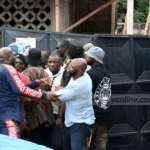
St. Peter’s Methodist Church in Odorkor is seriously considering withdrawing its premises as a collation centre for future elections, citing significant safety concerns and property damage inflicted during the volatile Ablekuma North parliamentary rerun on Friday, July 11.
The decision by the church leadership underscores the escalating challenges faced by public and private institutions that offer their spaces for Ghana’s electoral processes, often bearing the brunt of political tensions.
Rev. Ebenezer Kofi, the church’s overseer, confirmed the contemplation of this drastic step, expressing deep distress over the events that marred the rerun.
His announcement highlights a growing disillusionment among community institutions that provide vital support for Ghana’s democracy but often receive little protection or compensation when violence erupts.
Friday’s rerun in Ablekuma North, held across 19 polling stations to resolve a protracted electoral dispute from the December 7, 2024, general elections, was fraught with tension from the outset.
Their forceful entry disrupted the voting process, causing widespread panic among voters and leading to a temporary suspension of polling.
The assailants violently assaulted key figures of the New Patriotic Party (NPP), including the party’s parliamentary candidate, Nana Akua Afriyie, and former Fisheries Minister Hawa Koomson.
Eyewitnesses described the incident as “well-coordinated and deliberate”, suggesting premeditation rather than spontaneous unrest.
Police struggled to restore order, further emphasising the challenges in controlling politically motivated violence at polling centres.
Speaking in an interview with Citi News on Saturday, July 12, Rev. Kofi articulated the church’s resolve.
“A decision has to be taken by the leadership of the church where we will take the collation centre from here, and by extension, we will take the polling station from here to prevent further incidents,” he stated, indicating a broad consensus within the church leadership.
He confirmed that the church intends to formally request the Electoral Commission (EC) and security agencies to relocate both the collation centre and the nearby police post from the church premises.
Rev. Kofi also shed light on the cumulative impact of hosting electoral activities, revealing that the December 2024 general elections had also left a trail of damage at the church, yet the EC had offered no compensation.
“Most of our assets were vandalised and destroyed because of the collation… even yesterday I was told that the residence of one of the ministers was also damaged,” he lamented.
This lack of redress for damages often deters institutions from offering their facilities in subsequent elections, potentially forcing the EC to use less suitable venues.
The incident in Ablekuma North is not an isolated one but forms part of a worrying trend of increasing electoral violence in Ghana.
The 2020 general elections, for instance, were marred by multiple incidents of violence that resulted in at least eight fatalities, prompting widespread calls for accountability that largely remain unanswered.
The December 2024 elections also saw at least six deaths, alongside numerous reports of assaults on journalists and political figures.
Organisations like the Ghana Centre for Democratic Development (CDD-Ghana) and the Institute for War and Peace Reporting (IWPR) have consistently highlighted the entrenched nature of electoral violence and the prevailing culture of impunity.
Despite the NPP officially boycotting the rerun, its candidate, Nana Akua Afriyie, defied the party’s directive and contested the election.
She ultimately lost to Ewurabena Aubynn of the National Democratic Congress (NDC) by a narrow margin.
The rerun’s outcome shifts the balance of power in parliament, but the violence that accompanied it leaves a deeper scar on Ghana’s democratic fabric.
The incident at St. Peter’s Methodist Church in Odorkor serves as a potent reminder of the need for the Electoral Commission, political parties, and security agencies to proactively safeguard electoral venues and ensure accountability for violence.
Without robust measures to protect these critical democratic spaces and compensate for damages, the integrity and accessibility of Ghana’s electoral process remain at risk.
